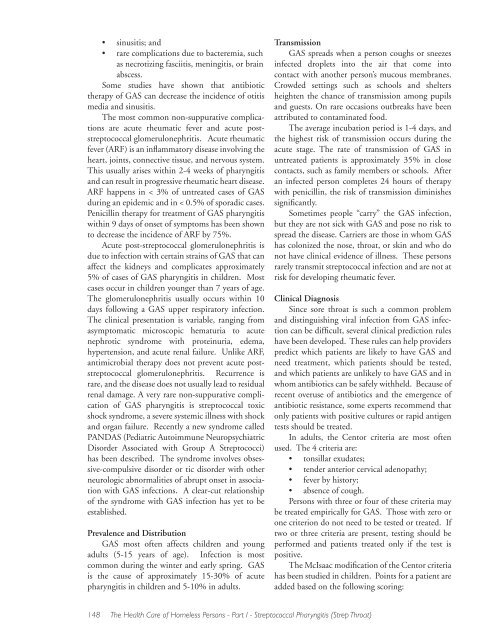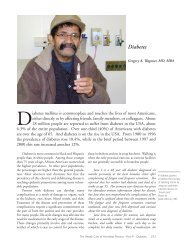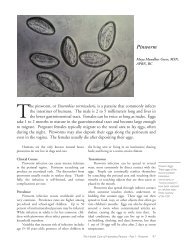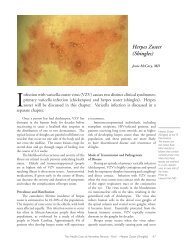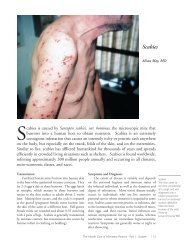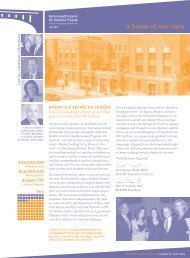Streptococcal Pharyngitis (Strep Throat) - Boston Health Care for the ...
Streptococcal Pharyngitis (Strep Throat) - Boston Health Care for the ...
Streptococcal Pharyngitis (Strep Throat) - Boston Health Care for the ...
You also want an ePaper? Increase the reach of your titles
YUMPU automatically turns print PDFs into web optimized ePapers that Google loves.
• sinusitis; and<br />
• rare complications due to bacteremia, such<br />
as necrotizing fasciitis, meningitis, or brain<br />
abscess.<br />
Some studies have shown that antibiotic<br />
<strong>the</strong>rapy of GAS can decrease <strong>the</strong> incidence of otitis<br />
media and sinusitis.<br />
The most common non-suppurative complications<br />
are acute rheumatic fever and acute poststreptococcal<br />
glomerulonephritis. Acute rheumatic<br />
fever (ARF) is an inflammatory disease involving <strong>the</strong><br />
heart, joints, connective tissue, and nervous system.<br />
This usually arises within 2-4 weeks of pharyngitis<br />
and can result in progressive rheumatic heart disease.<br />
ARF happens in < 3% of untreated cases of GAS<br />
during an epidemic and in < 0.5% of sporadic cases.<br />
Penicillin <strong>the</strong>rapy <strong>for</strong> treatment of GAS pharyngitis<br />
within 9 days of onset of symptoms has been shown<br />
to decrease <strong>the</strong> incidence of ARF by 75%.<br />
Acute post-streptococcal glomerulonephritis is<br />
due to infection with certain strains of GAS that can<br />
affect <strong>the</strong> kidneys and complicates approximately<br />
5% of cases of GAS pharyngitis in children. Most<br />
cases occur in children younger than 7 years of age.<br />
The glomerulonephritis usually occurs within 10<br />
days following a GAS upper respiratory infection.<br />
The clinical presentation is variable, ranging from<br />
asymptomatic microscopic hematuria to acute<br />
nephrotic syndrome with proteinuria, edema,<br />
hypertension, and acute renal failure. Unlike ARF,<br />
antimicrobial <strong>the</strong>rapy does not prevent acute poststreptococcal<br />
glomerulonephritis. Recurrence is<br />
rare, and <strong>the</strong> disease does not usually lead to residual<br />
renal damage. A very rare non-suppurative complication<br />
of GAS pharyngitis is streptococcal toxic<br />
shock syndrome, a severe systemic illness with shock<br />
and organ failure. Recently a new syndrome called<br />
PANDAS (Pediatric Autoimmune Neuropsychiatric<br />
Disorder Associated with Group A <strong>Strep</strong>tococci)<br />
has been described. The syndrome involves obsessive-compulsive<br />
disorder or tic disorder with o<strong>the</strong>r<br />
neurologic abnormalities of abrupt onset in association<br />
with GAS infections. A clear-cut relationship<br />
of <strong>the</strong> syndrome with GAS infection has yet to be<br />
established.<br />
Prevalence and Distribution<br />
GAS most often affects children and young<br />
adults (5-15 years of age). Infection is most<br />
common during <strong>the</strong> winter and early spring. GAS<br />
is <strong>the</strong> cause of approximately 15-30% of acute<br />
pharyngitis in children and 5-10% in adults.<br />
Transmission<br />
GAS spreads when a person coughs or sneezes<br />
infected droplets into <strong>the</strong> air that come into<br />
contact with ano<strong>the</strong>r person’s mucous membranes.<br />
Crowded settings such as schools and shelters<br />
heighten <strong>the</strong> chance of transmission among pupils<br />
and guests. On rare occasions outbreaks have been<br />
attributed to contaminated food.<br />
The average incubation period is 1-4 days, and<br />
<strong>the</strong> highest risk of transmission occurs during <strong>the</strong><br />
acute stage. The rate of transmission of GAS in<br />
untreated patients is approximately 35% in close<br />
contacts, such as family members or schools. After<br />
an infected person completes 24 hours of <strong>the</strong>rapy<br />
with penicillin, <strong>the</strong> risk of transmission diminishes<br />
significantly.<br />
Sometimes people “carry” <strong>the</strong> GAS infection,<br />
but <strong>the</strong>y are not sick with GAS and pose no risk to<br />
spread <strong>the</strong> disease. Carriers are those in whom GAS<br />
has colonized <strong>the</strong> nose, throat, or skin and who do<br />
not have clinical evidence of illness. These persons<br />
rarely transmit streptococcal infection and are not at<br />
risk <strong>for</strong> developing rheumatic fever.<br />
Clinical Diagnosis<br />
Since sore throat is such a common problem<br />
and distinguishing viral infection from GAS infection<br />
can be difficult, several clinical prediction rules<br />
have been developed. These rules can help providers<br />
predict which patients are likely to have GAS and<br />
need treatment, which patients should be tested,<br />
and which patients are unlikely to have GAS and in<br />
whom antibiotics can be safely withheld. Because of<br />
recent overuse of antibiotics and <strong>the</strong> emergence of<br />
antibiotic resistance, some experts recommend that<br />
only patients with positive cultures or rapid antigen<br />
tests should be treated.<br />
In adults, <strong>the</strong> Centor criteria are most often<br />
used. The 4 criteria are:<br />
• tonsillar exudates;<br />
• tender anterior cervical adenopathy;<br />
• fever by history;<br />
• absence of cough.<br />
Persons with three or four of <strong>the</strong>se criteria may<br />
be treated empirically <strong>for</strong> GAS. Those with zero or<br />
one criterion do not need to be tested or treated. If<br />
two or three criteria are present, testing should be<br />
per<strong>for</strong>med and patients treated only if <strong>the</strong> test is<br />
positive.<br />
The McIsaac modification of <strong>the</strong> Centor criteria<br />
has been studied in children. Points <strong>for</strong> a patient are<br />
added based on <strong>the</strong> following scoring:<br />
148 The <strong>Health</strong> <strong>Care</strong> of Homeless Persons - Part I - <strong><strong>Strep</strong>tococcal</strong> <strong>Pharyngitis</strong> (<strong>Strep</strong> <strong>Throat</strong>)


